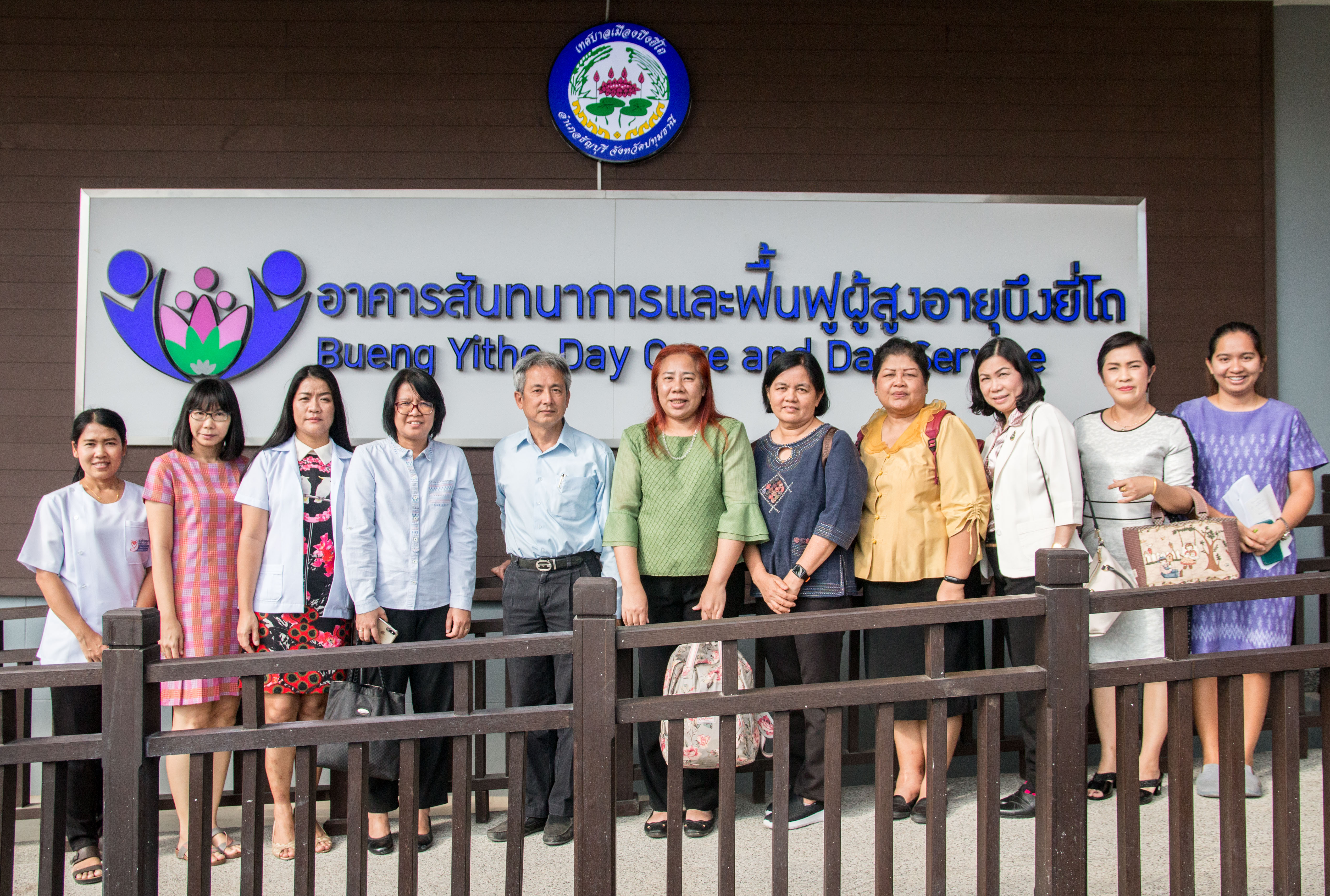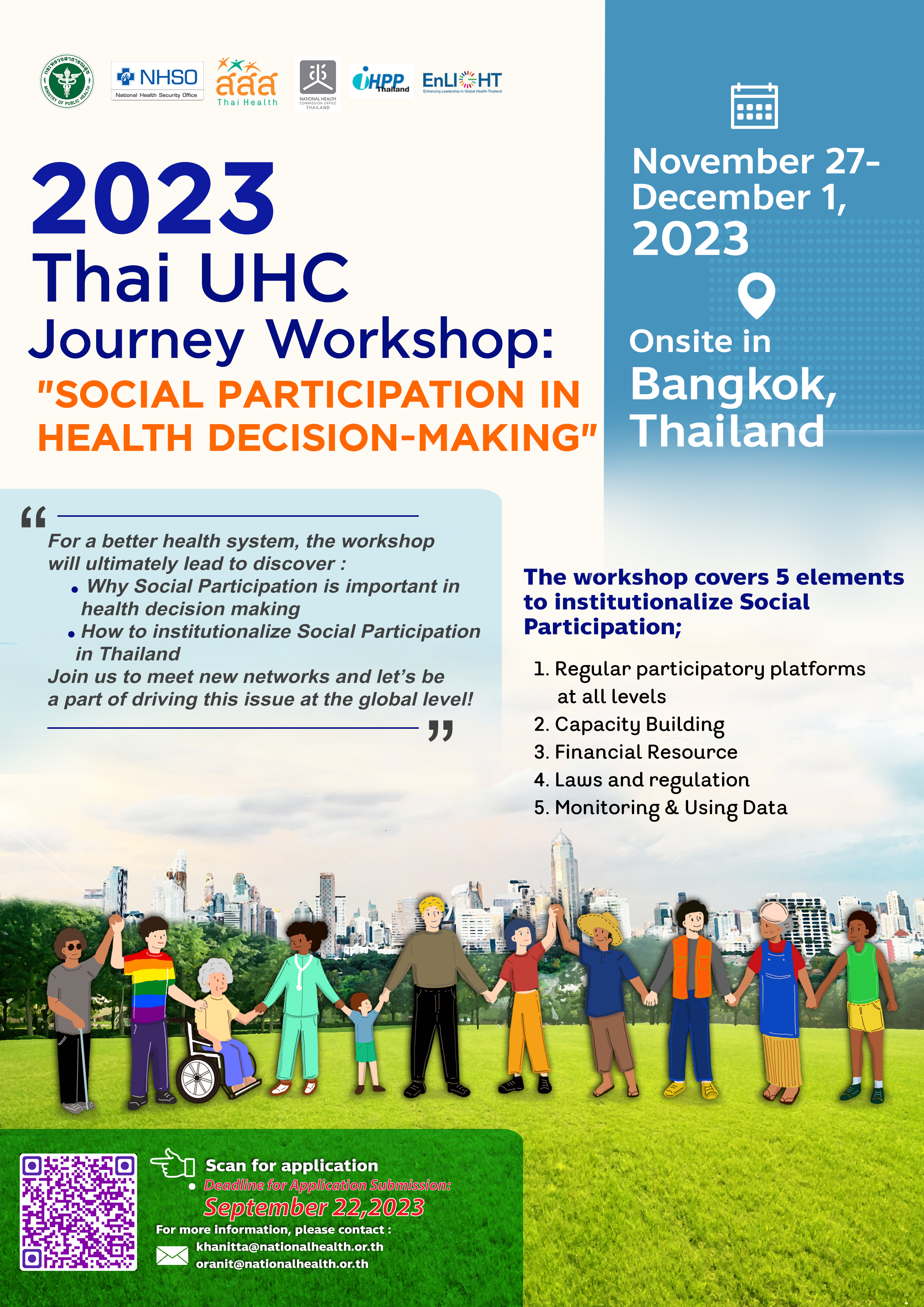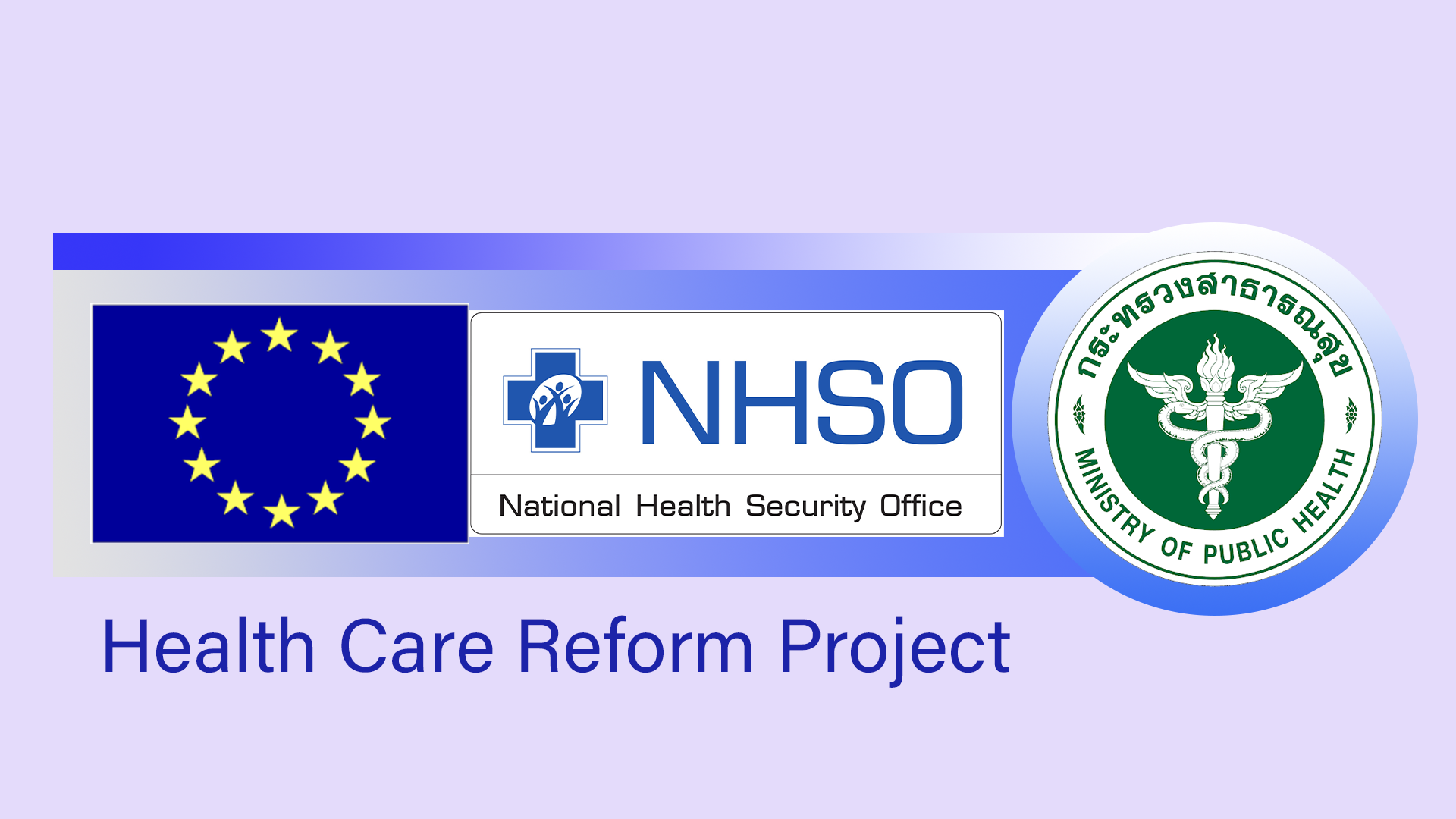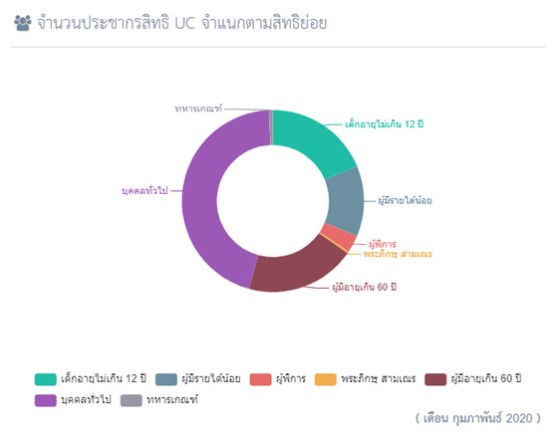Bueng Yitho strives to fight kidney disease
Bueng Yitho strives to fight kidney disease
 With its time-consuming and costly Haemodialysis (HD) technology, chronic kidney disease has always been expensive to treat. However, the advent of Peritoneal Dialysis (PD) technology gives patients a more affordable treatment option. Meanwhile, Bueng Yitho Medical and Rehabilitation Center, under Bueng Yitho Municipality (pop. 32,000), has been a strong advocate for the “PD First” campaign.
With its time-consuming and costly Haemodialysis (HD) technology, chronic kidney disease has always been expensive to treat. However, the advent of Peritoneal Dialysis (PD) technology gives patients a more affordable treatment option. Meanwhile, Bueng Yitho Medical and Rehabilitation Center, under Bueng Yitho Municipality (pop. 32,000), has been a strong advocate for the “PD First” campaign.
The centre offers primary care services covering comprehensive medical treatment, from prevention to diagnosis to rehabilitation, including alternative treatments. One of its main features is the “Kidney Clinic” that takes care of patients at risk of kidney failure. Patients with kidney disease stage 3, of which there are currently 77, are treated by a multi-disciplinary team, including doctors, nurses, pharmacists, physical therapists, and dentists who also dispense life quality improvement advice. Patients with kidney disease stage 4 are referred to partner hospitals.
After patients receive PD treatment, the clinic pays weekly visits to the patient’s home to assess the symptoms and environment in order to achieve the best results. Feedback is positive, with patients saying that the service gives them a better understanding of PD treatment and how to take care of themselves during the process. This, in turn, results in reduced complication rates.
In 2018, the clinic’s performance was satisfactory: 32 out of 62 patients with kidney disease stage 3, or 64%, reached a targeted glomerular filtration rate (GFR). Fourteen of them were well enough to leave the clinic.
Mr. Kwanjai Jaemtim, Director, Division of Public Health and Environment, Bueng Yitho Municipality, explained that the Kidney Clinic has developed “4 Steps to Fight Kidney Disease”. The Clinic provides individual advice on health aspects such as diet and how to properly administer PD at home. Advice is also given on kidney disease prevention through group activities. Physicians and pharmacists monitor drug use. Follow-up procedures involve laboratory work and physical examinations covering renal function, blood pressure, and blood sugar areas.
The Clinic’s success is also thanks to its partners, including Thanyaburi Hospital, Samutprakarn Hospital, National Health Security Office (NHSO) – District 4, and Faculty of Medicine, Srinakharinwirot University.
Going forward, Bueng Yitho Medical and Rehabilitation Center will push for the establishment of “CAPD Center” which will promote proper PD treatment practices for patients. There are also plans to elevate the Kidney Clinic to a standardized clinic certified by the Ministry of Public Health.
Assoc. Dr. Siribha Changsirikulchai, Head of Nephrology, Faculty of Medicine, Srinakharinwirot University, commented that PD treatment, whereby patients get to help themselves under the supervision of doctors, is well-suited to the Thai context with its limited resources.
 With its time-consuming and costly Haemodialysis (HD) technology, chronic kidney disease has always been expensive to treat. However, the advent of Peritoneal Dialysis (PD) technology gives patients a more affordable treatment option. Meanwhile, Bueng Yitho Medical and Rehabilitation Center, under Bueng Yitho Municipality (pop. 32,000), has been a strong advocate for the “PD First” campaign.
With its time-consuming and costly Haemodialysis (HD) technology, chronic kidney disease has always been expensive to treat. However, the advent of Peritoneal Dialysis (PD) technology gives patients a more affordable treatment option. Meanwhile, Bueng Yitho Medical and Rehabilitation Center, under Bueng Yitho Municipality (pop. 32,000), has been a strong advocate for the “PD First” campaign.The centre offers primary care services covering comprehensive medical treatment, from prevention to diagnosis to rehabilitation, including alternative treatments. One of its main features is the “Kidney Clinic” that takes care of patients at risk of kidney failure. Patients with kidney disease stage 3, of which there are currently 77, are treated by a multi-disciplinary team, including doctors, nurses, pharmacists, physical therapists, and dentists who also dispense life quality improvement advice. Patients with kidney disease stage 4 are referred to partner hospitals.
After patients receive PD treatment, the clinic pays weekly visits to the patient’s home to assess the symptoms and environment in order to achieve the best results. Feedback is positive, with patients saying that the service gives them a better understanding of PD treatment and how to take care of themselves during the process. This, in turn, results in reduced complication rates.
In 2018, the clinic’s performance was satisfactory: 32 out of 62 patients with kidney disease stage 3, or 64%, reached a targeted glomerular filtration rate (GFR). Fourteen of them were well enough to leave the clinic.
Mr. Kwanjai Jaemtim, Director, Division of Public Health and Environment, Bueng Yitho Municipality, explained that the Kidney Clinic has developed “4 Steps to Fight Kidney Disease”. The Clinic provides individual advice on health aspects such as diet and how to properly administer PD at home. Advice is also given on kidney disease prevention through group activities. Physicians and pharmacists monitor drug use. Follow-up procedures involve laboratory work and physical examinations covering renal function, blood pressure, and blood sugar areas.
The Clinic’s success is also thanks to its partners, including Thanyaburi Hospital, Samutprakarn Hospital, National Health Security Office (NHSO) – District 4, and Faculty of Medicine, Srinakharinwirot University.
Going forward, Bueng Yitho Medical and Rehabilitation Center will push for the establishment of “CAPD Center” which will promote proper PD treatment practices for patients. There are also plans to elevate the Kidney Clinic to a standardized clinic certified by the Ministry of Public Health.
Assoc. Dr. Siribha Changsirikulchai, Head of Nephrology, Faculty of Medicine, Srinakharinwirot University, commented that PD treatment, whereby patients get to help themselves under the supervision of doctors, is well-suited to the Thai context with its limited resources.
IN DEPTH
Bueng Yitho strives to fight kidney disease
Bueng Yitho strives to fight kidney disease
 With its time-consuming and costly Haemodialysis (HD) technology, chronic kidney disease has always been expensive to treat. However, the advent of Peritoneal Dialysis (PD) technology gives patients a more affordable treatment option. Meanwhile, Bueng Yitho Medical and Rehabilitation Center, under Bueng Yitho Municipality (pop. 32,000), has been a strong advocate for the “PD First” campaign.
With its time-consuming and costly Haemodialysis (HD) technology, chronic kidney disease has always been expensive to treat. However, the advent of Peritoneal Dialysis (PD) technology gives patients a more affordable treatment option. Meanwhile, Bueng Yitho Medical and Rehabilitation Center, under Bueng Yitho Municipality (pop. 32,000), has been a strong advocate for the “PD First” campaign.
The centre offers primary care services covering comprehensive medical treatment, from prevention to diagnosis to rehabilitation, including alternative treatments. One of its main features is the “Kidney Clinic” that takes care of patients at risk of kidney failure. Patients with kidney disease stage 3, of which there are currently 77, are treated by a multi-disciplinary team, including doctors, nurses, pharmacists, physical therapists, and dentists who also dispense life quality improvement advice. Patients with kidney disease stage 4 are referred to partner hospitals.
After patients receive PD treatment, the clinic pays weekly visits to the patient’s home to assess the symptoms and environment in order to achieve the best results. Feedback is positive, with patients saying that the service gives them a better understanding of PD treatment and how to take care of themselves during the process. This, in turn, results in reduced complication rates.
In 2018, the clinic’s performance was satisfactory: 32 out of 62 patients with kidney disease stage 3, or 64%, reached a targeted glomerular filtration rate (GFR). Fourteen of them were well enough to leave the clinic.
Mr. Kwanjai Jaemtim, Director, Division of Public Health and Environment, Bueng Yitho Municipality, explained that the Kidney Clinic has developed “4 Steps to Fight Kidney Disease”. The Clinic provides individual advice on health aspects such as diet and how to properly administer PD at home. Advice is also given on kidney disease prevention through group activities. Physicians and pharmacists monitor drug use. Follow-up procedures involve laboratory work and physical examinations covering renal function, blood pressure, and blood sugar areas.
The Clinic’s success is also thanks to its partners, including Thanyaburi Hospital, Samutprakarn Hospital, National Health Security Office (NHSO) – District 4, and Faculty of Medicine, Srinakharinwirot University.
Going forward, Bueng Yitho Medical and Rehabilitation Center will push for the establishment of “CAPD Center” which will promote proper PD treatment practices for patients. There are also plans to elevate the Kidney Clinic to a standardized clinic certified by the Ministry of Public Health.
Assoc. Dr. Siribha Changsirikulchai, Head of Nephrology, Faculty of Medicine, Srinakharinwirot University, commented that PD treatment, whereby patients get to help themselves under the supervision of doctors, is well-suited to the Thai context with its limited resources.
 With its time-consuming and costly Haemodialysis (HD) technology, chronic kidney disease has always been expensive to treat. However, the advent of Peritoneal Dialysis (PD) technology gives patients a more affordable treatment option. Meanwhile, Bueng Yitho Medical and Rehabilitation Center, under Bueng Yitho Municipality (pop. 32,000), has been a strong advocate for the “PD First” campaign.
With its time-consuming and costly Haemodialysis (HD) technology, chronic kidney disease has always been expensive to treat. However, the advent of Peritoneal Dialysis (PD) technology gives patients a more affordable treatment option. Meanwhile, Bueng Yitho Medical and Rehabilitation Center, under Bueng Yitho Municipality (pop. 32,000), has been a strong advocate for the “PD First” campaign.The centre offers primary care services covering comprehensive medical treatment, from prevention to diagnosis to rehabilitation, including alternative treatments. One of its main features is the “Kidney Clinic” that takes care of patients at risk of kidney failure. Patients with kidney disease stage 3, of which there are currently 77, are treated by a multi-disciplinary team, including doctors, nurses, pharmacists, physical therapists, and dentists who also dispense life quality improvement advice. Patients with kidney disease stage 4 are referred to partner hospitals.
After patients receive PD treatment, the clinic pays weekly visits to the patient’s home to assess the symptoms and environment in order to achieve the best results. Feedback is positive, with patients saying that the service gives them a better understanding of PD treatment and how to take care of themselves during the process. This, in turn, results in reduced complication rates.
In 2018, the clinic’s performance was satisfactory: 32 out of 62 patients with kidney disease stage 3, or 64%, reached a targeted glomerular filtration rate (GFR). Fourteen of them were well enough to leave the clinic.
Mr. Kwanjai Jaemtim, Director, Division of Public Health and Environment, Bueng Yitho Municipality, explained that the Kidney Clinic has developed “4 Steps to Fight Kidney Disease”. The Clinic provides individual advice on health aspects such as diet and how to properly administer PD at home. Advice is also given on kidney disease prevention through group activities. Physicians and pharmacists monitor drug use. Follow-up procedures involve laboratory work and physical examinations covering renal function, blood pressure, and blood sugar areas.
The Clinic’s success is also thanks to its partners, including Thanyaburi Hospital, Samutprakarn Hospital, National Health Security Office (NHSO) – District 4, and Faculty of Medicine, Srinakharinwirot University.
Going forward, Bueng Yitho Medical and Rehabilitation Center will push for the establishment of “CAPD Center” which will promote proper PD treatment practices for patients. There are also plans to elevate the Kidney Clinic to a standardized clinic certified by the Ministry of Public Health.
Assoc. Dr. Siribha Changsirikulchai, Head of Nephrology, Faculty of Medicine, Srinakharinwirot University, commented that PD treatment, whereby patients get to help themselves under the supervision of doctors, is well-suited to the Thai context with its limited resources.
Events
Bueng Yitho strives to fight kidney disease
Bueng Yitho strives to fight kidney disease
 With its time-consuming and costly Haemodialysis (HD) technology, chronic kidney disease has always been expensive to treat. However, the advent of Peritoneal Dialysis (PD) technology gives patients a more affordable treatment option. Meanwhile, Bueng Yitho Medical and Rehabilitation Center, under Bueng Yitho Municipality (pop. 32,000), has been a strong advocate for the “PD First” campaign.
With its time-consuming and costly Haemodialysis (HD) technology, chronic kidney disease has always been expensive to treat. However, the advent of Peritoneal Dialysis (PD) technology gives patients a more affordable treatment option. Meanwhile, Bueng Yitho Medical and Rehabilitation Center, under Bueng Yitho Municipality (pop. 32,000), has been a strong advocate for the “PD First” campaign.
The centre offers primary care services covering comprehensive medical treatment, from prevention to diagnosis to rehabilitation, including alternative treatments. One of its main features is the “Kidney Clinic” that takes care of patients at risk of kidney failure. Patients with kidney disease stage 3, of which there are currently 77, are treated by a multi-disciplinary team, including doctors, nurses, pharmacists, physical therapists, and dentists who also dispense life quality improvement advice. Patients with kidney disease stage 4 are referred to partner hospitals.
After patients receive PD treatment, the clinic pays weekly visits to the patient’s home to assess the symptoms and environment in order to achieve the best results. Feedback is positive, with patients saying that the service gives them a better understanding of PD treatment and how to take care of themselves during the process. This, in turn, results in reduced complication rates.
In 2018, the clinic’s performance was satisfactory: 32 out of 62 patients with kidney disease stage 3, or 64%, reached a targeted glomerular filtration rate (GFR). Fourteen of them were well enough to leave the clinic.
Mr. Kwanjai Jaemtim, Director, Division of Public Health and Environment, Bueng Yitho Municipality, explained that the Kidney Clinic has developed “4 Steps to Fight Kidney Disease”. The Clinic provides individual advice on health aspects such as diet and how to properly administer PD at home. Advice is also given on kidney disease prevention through group activities. Physicians and pharmacists monitor drug use. Follow-up procedures involve laboratory work and physical examinations covering renal function, blood pressure, and blood sugar areas.
The Clinic’s success is also thanks to its partners, including Thanyaburi Hospital, Samutprakarn Hospital, National Health Security Office (NHSO) – District 4, and Faculty of Medicine, Srinakharinwirot University.
Going forward, Bueng Yitho Medical and Rehabilitation Center will push for the establishment of “CAPD Center” which will promote proper PD treatment practices for patients. There are also plans to elevate the Kidney Clinic to a standardized clinic certified by the Ministry of Public Health.
Assoc. Dr. Siribha Changsirikulchai, Head of Nephrology, Faculty of Medicine, Srinakharinwirot University, commented that PD treatment, whereby patients get to help themselves under the supervision of doctors, is well-suited to the Thai context with its limited resources.
 With its time-consuming and costly Haemodialysis (HD) technology, chronic kidney disease has always been expensive to treat. However, the advent of Peritoneal Dialysis (PD) technology gives patients a more affordable treatment option. Meanwhile, Bueng Yitho Medical and Rehabilitation Center, under Bueng Yitho Municipality (pop. 32,000), has been a strong advocate for the “PD First” campaign.
With its time-consuming and costly Haemodialysis (HD) technology, chronic kidney disease has always been expensive to treat. However, the advent of Peritoneal Dialysis (PD) technology gives patients a more affordable treatment option. Meanwhile, Bueng Yitho Medical and Rehabilitation Center, under Bueng Yitho Municipality (pop. 32,000), has been a strong advocate for the “PD First” campaign.The centre offers primary care services covering comprehensive medical treatment, from prevention to diagnosis to rehabilitation, including alternative treatments. One of its main features is the “Kidney Clinic” that takes care of patients at risk of kidney failure. Patients with kidney disease stage 3, of which there are currently 77, are treated by a multi-disciplinary team, including doctors, nurses, pharmacists, physical therapists, and dentists who also dispense life quality improvement advice. Patients with kidney disease stage 4 are referred to partner hospitals.
After patients receive PD treatment, the clinic pays weekly visits to the patient’s home to assess the symptoms and environment in order to achieve the best results. Feedback is positive, with patients saying that the service gives them a better understanding of PD treatment and how to take care of themselves during the process. This, in turn, results in reduced complication rates.
In 2018, the clinic’s performance was satisfactory: 32 out of 62 patients with kidney disease stage 3, or 64%, reached a targeted glomerular filtration rate (GFR). Fourteen of them were well enough to leave the clinic.
Mr. Kwanjai Jaemtim, Director, Division of Public Health and Environment, Bueng Yitho Municipality, explained that the Kidney Clinic has developed “4 Steps to Fight Kidney Disease”. The Clinic provides individual advice on health aspects such as diet and how to properly administer PD at home. Advice is also given on kidney disease prevention through group activities. Physicians and pharmacists monitor drug use. Follow-up procedures involve laboratory work and physical examinations covering renal function, blood pressure, and blood sugar areas.
The Clinic’s success is also thanks to its partners, including Thanyaburi Hospital, Samutprakarn Hospital, National Health Security Office (NHSO) – District 4, and Faculty of Medicine, Srinakharinwirot University.
Going forward, Bueng Yitho Medical and Rehabilitation Center will push for the establishment of “CAPD Center” which will promote proper PD treatment practices for patients. There are also plans to elevate the Kidney Clinic to a standardized clinic certified by the Ministry of Public Health.
Assoc. Dr. Siribha Changsirikulchai, Head of Nephrology, Faculty of Medicine, Srinakharinwirot University, commented that PD treatment, whereby patients get to help themselves under the supervision of doctors, is well-suited to the Thai context with its limited resources.
RESOURCE CENTER
SECRETARY-GENERAL
Bueng Yitho strives to fight kidney disease
Bueng Yitho strives to fight kidney disease
 With its time-consuming and costly Haemodialysis (HD) technology, chronic kidney disease has always been expensive to treat. However, the advent of Peritoneal Dialysis (PD) technology gives patients a more affordable treatment option. Meanwhile, Bueng Yitho Medical and Rehabilitation Center, under Bueng Yitho Municipality (pop. 32,000), has been a strong advocate for the “PD First” campaign.
With its time-consuming and costly Haemodialysis (HD) technology, chronic kidney disease has always been expensive to treat. However, the advent of Peritoneal Dialysis (PD) technology gives patients a more affordable treatment option. Meanwhile, Bueng Yitho Medical and Rehabilitation Center, under Bueng Yitho Municipality (pop. 32,000), has been a strong advocate for the “PD First” campaign.
The centre offers primary care services covering comprehensive medical treatment, from prevention to diagnosis to rehabilitation, including alternative treatments. One of its main features is the “Kidney Clinic” that takes care of patients at risk of kidney failure. Patients with kidney disease stage 3, of which there are currently 77, are treated by a multi-disciplinary team, including doctors, nurses, pharmacists, physical therapists, and dentists who also dispense life quality improvement advice. Patients with kidney disease stage 4 are referred to partner hospitals.
After patients receive PD treatment, the clinic pays weekly visits to the patient’s home to assess the symptoms and environment in order to achieve the best results. Feedback is positive, with patients saying that the service gives them a better understanding of PD treatment and how to take care of themselves during the process. This, in turn, results in reduced complication rates.
In 2018, the clinic’s performance was satisfactory: 32 out of 62 patients with kidney disease stage 3, or 64%, reached a targeted glomerular filtration rate (GFR). Fourteen of them were well enough to leave the clinic.
Mr. Kwanjai Jaemtim, Director, Division of Public Health and Environment, Bueng Yitho Municipality, explained that the Kidney Clinic has developed “4 Steps to Fight Kidney Disease”. The Clinic provides individual advice on health aspects such as diet and how to properly administer PD at home. Advice is also given on kidney disease prevention through group activities. Physicians and pharmacists monitor drug use. Follow-up procedures involve laboratory work and physical examinations covering renal function, blood pressure, and blood sugar areas.
The Clinic’s success is also thanks to its partners, including Thanyaburi Hospital, Samutprakarn Hospital, National Health Security Office (NHSO) – District 4, and Faculty of Medicine, Srinakharinwirot University.
Going forward, Bueng Yitho Medical and Rehabilitation Center will push for the establishment of “CAPD Center” which will promote proper PD treatment practices for patients. There are also plans to elevate the Kidney Clinic to a standardized clinic certified by the Ministry of Public Health.
Assoc. Dr. Siribha Changsirikulchai, Head of Nephrology, Faculty of Medicine, Srinakharinwirot University, commented that PD treatment, whereby patients get to help themselves under the supervision of doctors, is well-suited to the Thai context with its limited resources.
 With its time-consuming and costly Haemodialysis (HD) technology, chronic kidney disease has always been expensive to treat. However, the advent of Peritoneal Dialysis (PD) technology gives patients a more affordable treatment option. Meanwhile, Bueng Yitho Medical and Rehabilitation Center, under Bueng Yitho Municipality (pop. 32,000), has been a strong advocate for the “PD First” campaign.
With its time-consuming and costly Haemodialysis (HD) technology, chronic kidney disease has always been expensive to treat. However, the advent of Peritoneal Dialysis (PD) technology gives patients a more affordable treatment option. Meanwhile, Bueng Yitho Medical and Rehabilitation Center, under Bueng Yitho Municipality (pop. 32,000), has been a strong advocate for the “PD First” campaign.The centre offers primary care services covering comprehensive medical treatment, from prevention to diagnosis to rehabilitation, including alternative treatments. One of its main features is the “Kidney Clinic” that takes care of patients at risk of kidney failure. Patients with kidney disease stage 3, of which there are currently 77, are treated by a multi-disciplinary team, including doctors, nurses, pharmacists, physical therapists, and dentists who also dispense life quality improvement advice. Patients with kidney disease stage 4 are referred to partner hospitals.
After patients receive PD treatment, the clinic pays weekly visits to the patient’s home to assess the symptoms and environment in order to achieve the best results. Feedback is positive, with patients saying that the service gives them a better understanding of PD treatment and how to take care of themselves during the process. This, in turn, results in reduced complication rates.
In 2018, the clinic’s performance was satisfactory: 32 out of 62 patients with kidney disease stage 3, or 64%, reached a targeted glomerular filtration rate (GFR). Fourteen of them were well enough to leave the clinic.
Mr. Kwanjai Jaemtim, Director, Division of Public Health and Environment, Bueng Yitho Municipality, explained that the Kidney Clinic has developed “4 Steps to Fight Kidney Disease”. The Clinic provides individual advice on health aspects such as diet and how to properly administer PD at home. Advice is also given on kidney disease prevention through group activities. Physicians and pharmacists monitor drug use. Follow-up procedures involve laboratory work and physical examinations covering renal function, blood pressure, and blood sugar areas.
The Clinic’s success is also thanks to its partners, including Thanyaburi Hospital, Samutprakarn Hospital, National Health Security Office (NHSO) – District 4, and Faculty of Medicine, Srinakharinwirot University.
Going forward, Bueng Yitho Medical and Rehabilitation Center will push for the establishment of “CAPD Center” which will promote proper PD treatment practices for patients. There are also plans to elevate the Kidney Clinic to a standardized clinic certified by the Ministry of Public Health.
Assoc. Dr. Siribha Changsirikulchai, Head of Nephrology, Faculty of Medicine, Srinakharinwirot University, commented that PD treatment, whereby patients get to help themselves under the supervision of doctors, is well-suited to the Thai context with its limited resources.
VIDEOS
Thailand's UHC Journey
UHC Public relations



















